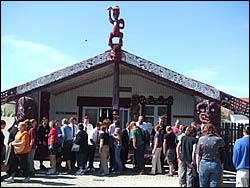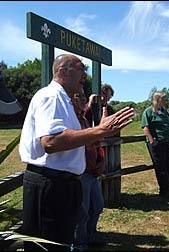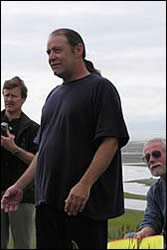Maori and ICM
Research Status: Ongoing |
AGM 2005 - visit to Te Awhina marae |
Introduction
Maori (indigenous groups) are an essential part of Integrated Catchment Management (ICM) in New Zealand. The ICM project is working closely with local Maori (tangata whenua) and associated groups, to learn how to make biophysical research more responsive to Maori needs, and for researchers to better understand Maori values and issues. We are developing an environment for social and cultural learning, collaborative research, and partnerships. Our ultimate goal is to improve decision making for the sustainable management of natural resources in catchments.
Research Approach
Work with iwi and hapu groups to identify specific tangata whenua (local Maori) issues in the Motueka catchment and other regional tribal areas, develop an understanding of Maori Values, Maori History, and establish a network and learning group for effective use of science information from the ICM programme, and identify opportunities for collaborative research. Current links to related local websites include those developed by Wakatu Incorporation and Ngati Rarua Te Atiawa Iwi Trust (NRAIT).
- Collaborative learning - understanding how we share our knowledge and use it.
- Indigenous knowledge and values - understanding different knowledge bases and the values associated with those.
The methods will be used to contribute to an outcome of "sustainable management of land and water resources which incorporates Maori concerns and issues, identifies Maori research priorities and information needs, and increases iwi/hapu/whanau participation with council, stakeholder, community, and research groups". Hui, personal discussions, field visits, and interaction between iwi/hapu and project researchers will be required to maintain and enhance relationships. Documenting information on Maori history and Maori values of the Motueka catchment will continue to provide a basis for understanding spatial and temporal environmental and cultural change, identify iwi/hapu issues, and provide Maori knowledge that can contribute to future integrated and complementary knowledge systems. The following tasks are anticipated:
- Refine and use iwi/hapu issues to determine iwi/hapu research priorities, and identify research questions and information needs. Identify research questions that are either more generic or nationally focussed (e.g. effective iwi/hapu-Crown partnerships for resource mangement planning and policy) or specific catchment oriented research questions (e.g. land use effects on cultural values). Identify potential iwi/hapu projects. Use information on issues and cultural research priorities to help shape ICM programme objectives to maximise research relevance to iwi/hapu and benefits back to iwi/hapu groups and Maori organisations, define information needs, and improve two way information flows between iwi/hapu, ICM programme researchers and other groups.
- Document information on Maori history and Maori values of the Motueka catchment to provide a basis for understanding spatial and temporal environmental and cultural change, iwi/hapu issues, and provide Maori knowledge which can contribute to future integrated and complementary knowledge systems.
- Identify and evaluate effective relationship and partnership processes and models which can be used to maximise social learning between groups, understanding of cultural values and proceses, and to improve participation by iwi/hapu in research and resource management policy and planning. We will examine the way iwi/hapu are presently involved in resource management planning and policy to date and identify processes and models which improve iwi/hapu interaction and learning with existing groups (e.g. local government - Crown, research, stakeholder, community) and increase participation in the ICM programme and in resource management planning and policy in general.
Research Results
The establishment and maintenance of an on-going relationship with the "people of the land" is extremely important. To understand the nature of the significance Tangata Whenua play in resource management it is important to start with some historical and traditional understanding of the region. This provides a platform for the present day and the future. See More details or follow the links below.
- Maori migration and occupation into the northern South Island and Motueka catchment
- Maori values and history
- Maori present day
Several collaborative projects with iwi and hapu, including reports and papers, have been developed as part of our ICM work with iwi.
 |
 |
Barney Thomas at Puketawai - AGM 2005 |
Mick Park at Puketawai - AGM 2005 |
Recent Publications
Recent Presentations
BMPs, BEPs and Guidelines
| Title | Description |
| Heritage Management Guidelines for Resource Management Practitioners |
From Guide: Guidelines on sustainable management of historic heritage to promote understanding...More » |
| Effective Participation in Resource Consent Processes: A guide for Tangata Whenua |
From website: This guide aims to help tangata whenua to participate effectively in resource co...More » |
| Good Practice Guidelines for Working with Tangata Whenua and Māori Organisations: Consolidating our learning | These good practice guidelines are based on just over a decade of learning by central and local gove...More » |
| Kawe Korero: Guidelines for communicating with Maori |
From guide: These Guidelines for Communicating with Mäori have been developed to assist staff ...More » |
| Kaitiakitanga and Local Government: Tangata Whenua participation in environmental management | A practical guide for incorporating the values of tangata Whenua into the decision making process co...More » |
| Talking Constructively: A practical guide for building agreements between iwi, hapu and whanau, and loca authorities |
From website: This guide is designed to be a practical summary to help iwi, hapu and whanau an...More » |
| Assessment of Environmental Effects. Chapter 11: Consultation Approaches |
From website: THe consulative programme was developed to canvas particular matters of interest...More » |
| Maori and the Resource Management Act |
Edited from guide: A guide on incorporating Maori involvement in the management of natural and...More » |
| Guidelines for Consulting with Tangata Whenua under the RMA: An Update on Case Law |
From website: This publication provides guidance on how to undertake consultation with tangata...More » |
| Kaimoana Survey Guidelines for Hapu and Iwi |
From MfE website. These guidelines provide hapu and iwi with information and a suggested proce...More » |
Primary Contacts:

|
Garth Harmsworth
Email More details» |
Institute Landcare Research |
Expertise environmental planning, Maori research, Maori issues, land resource assessment, GIS applications. |

|
Mick Park
Email |
Institute |
Expertise iwi projects; harakeke; fungi for remediation |